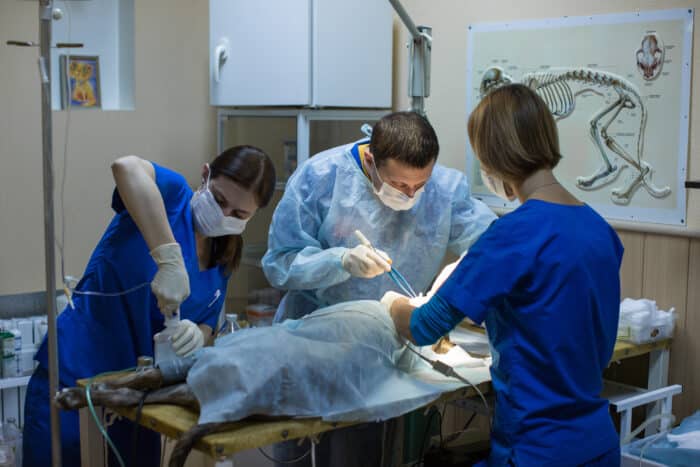If you want to be part of a surgical environment and want to explore this career you can also explore the career as a Veterinary Surgical Technologist.
To succeed in this career besides being a good surgical tech you also need to love pets and enjoy being around animals.
In this article, we’ll be discussing surgical vet tech, their duties, education, certification, requirements, salary and job outlook, how to become one, and much more.
Let’s begin –
What Is a Veterinary Surgical Technologist?
A veterinary surgical technologist is a skilled professional who assists veterinarians during surgical procedures on animals. They play a vital role in ensuring the safety and well-being of animals during surgeries.
Just like Surgical Techs, Vet Surgical Techs also prepare the surgical environment, sterilize instruments, and provide support during the procedures. They also monitor the animals’ vital signs, administer anesthesia, and assist with post-operative care.
Additionally, they maintain surgical records and may educate pet owners about proper post-surgery care. Veterinary surgical technologists help ensure that animals receive the necessary medical attention and care during surgical interventions.
What Do They Do?
Veterinary surgical technologists work alongside veterinarians in surgical procedures on animals. Here’s what they do –
- Their responsibilities include preparing the surgical suite, sterilizing instruments, and assisting during surgeries.
- They monitor the patient’s vital signs, administer anesthesia, and handle post-operative care.
- They also maintain surgical records and help educate pet owners on post-surgery care.
- They play a crucial role in ensuring the well-being of animals during medical procedures.
Read:
-> What Does a Surgical Tech Do?
Surgical Vet Tech Education and Training
To become a surgical veterinary technician, you’ll typically need to earn an associate’s degree in veterinary technology from an institution accredited by the American Veterinary Medical Association (AVMA).
These programs often last two years and include classroom instruction and hands-on training. Besides that, you’ll also hone skills like surgical techniques, anesthesia administration, and other vital skills for the operating room.
Surgical Vet Tech Certification
Although certification isn’t always mandatory, becoming a Certified Veterinary Technician (CVT) can enhance your career prospects.
To become certified, you’ll typically need to pass the Veterinary Technician National Examination (VTNE) conducted by AAVSB (American Association of Veterinary State Boards), and also acquire any additional state requirements. Moreover, acquiring a CST certification can also be helpful.
Ultimately to become a Surgical Vet Tech, you need to be eligible and pass the exam [VTS (Surgery) or Veterinary Technician Specialist in Surgery] conducted by the Academy of Veterinary Surgical Technicians (AVST).
Also Read:
-> Surgical Tech Certification
-> How to Become a Certified Surgical Tech?
Surgical Vet Tech Requirements
Becoming a veterinary surgical technologist is a rewarding path for those who have a passion for animal health and a love for hands-on work in the operating room.
To become a Surgical Vet Tech, you need to meet certain requirements. Here are those –
- You need an Associate degree in veterinary technology
- You mandatorily need to seek Practical Experience
- You should acquire a CVT Certification and/or state licensure
- Formal education or Understanding of surgical equipment, surgical procedures, surgical preparation, and post-operative care (as per state laws)
- Ability to administer anesthesia and monitor patients during surgery
Read -> Surgical Tech Requirements
Salary and Job Outlook
As per ZipRecruiter’s Oct 2023 salary data, the annual average salary of Vet Surgical Tech is $43,246 with an hourly rate of $21. The top 10% earned an average salary of $54,680, while the lowest 10% earned around $29,000.
As per BLS 2022 data, the projected employment growth of veterinary technologists and technicians is 21% in this decade. This means roughly 14,800 new job openings each year, on average, over the decade.
Read -> Surgical Tech Salary
How To Become a Vet Surgical Tech?
If you’ve ever dreamt of a career in the medical field, that too dealing with animals then becoming a veterinary surgical technologist might be the perfect choice for you.
These professionals play a crucial role in assisting veterinarians during surgeries and ensuring the well-being of animal patients. But, becoming one is not so easy.
If you’re ready to embark on this rewarding career path, here’s a step-by-step guide to help you become a Vet Surgical Tech.
Step 1 – High School Education
A high school diploma or equivalent is the starting point for your future career. If you have a high school education focusing on biology, chemistry, and other science-related courses, then that’s even more wonderful.
Step 2 – Choose an Accredited Veterinary Technology Program
To become a veterinary surgical technologist, you’ll need formal education. Look for an accredited veterinary technology program by the American Veterinary Medical Association (AVMA).
These programs often offer associate degrees in veterinary technology and include both coursework and hands-on clinical training.
Read More:
-> Online Surgical Tech Programs
-> Surgical Tech Classes & Courses
-> Surgical Tech Program & Training
Step 3 – Complete Your Veterinary Technology Program
While enrolled in the veterinary technology program, you’ll learn about various aspects of animal care, from radiology and anesthesia to animal nursing and surgical procedures. Specialize in surgical techniques and pay close attention to this critical aspect of your education.
Step 4 – Gain Practical Experience
After completing your veterinary technology program and obtaining certification, it’s time to gain hands-on experience. You’ll acquire practical skills and become familiar with surgical settings and the experience is invaluable while working in the field.
Step 5 – Consider Vet Tech Certification
Just like with Surgical Techs, Vet Techs also don’t need mandatory certification. But becoming a certified veterinary technician (CVT) can enhance your career prospects.
To become certified, you’ll typically need to pass the Veterinary Technician National Examination (VTNE) conducted by AAVSB (American Association of Veterinary State Boards), and meet any additional state requirements. Many employers prefer certification for their veterinary surgical technologists.
Step 6 – Specialize in Surgical Technology
Since your goal is to become a veterinary surgical technologist, you should consider additional training and experience specifically focused on surgical procedures.
While you’ll learn about this during your veterinary technology program and on the job, additional training can set you apart as an expert in this area.
Also, you can acquire a CST certification to have more credibility. No, a CST is not absolutely required, but some might prefer both or just leap above the competition.
You May Also Like:
-> Can You Be a Surgical Tech Without Certification?
-> Sterile Processing Technician vs Surgical Technologist
Step 7 – Consider Surgical Vet Tech Certification
Now, the final step is to get certified as a Surgical Vet Tech. To achieve this, you must have completed a minimum of 10,000 hours (5 years) of employment as a credentialed technician.
Only then you can appear for the exam [VTS (Surgery) or Veterinary Technician Specialist in Surgery] conducted by the Academy of Veterinary Surgical Technicians (AVST).
Furthermore, the experience hours are divided into general and surgical hours. First, you may have to acquire 3 years (6000 hours) of general vet tech experience before applying for certifications. Then, you need to dedicate 4500 hours (75% of 6000) of your time performing veterinary surgical duties.
This means you need 6,000 hours of general experience, plus 4,500 hours of surgical experience, for a total of 10,500 hours of combined experience.
Also Read:
Step 8 – Seek Employment
With your education, certification, experience, and specialized training, you’re ready to enter the employment scene as a veterinary surgical technologist. Apply for positions at veterinary clinics, animal hospitals, research facilities, or wherever your passion for animal care takes you.
Read:
-> Is Surgical Tech School Hard?
-> How to Become a Surgical Tech?
FAQs – Surgical Vet Tech
Can A Surgical Tech Work as A Vet Tech?
In most cases, a surgical tech cannot work as a surgical veterinary technician without additional training and certification specific to the veterinary field.
While surgical techs have valuable skills related to surgical procedures and operating room protocols, these skills may not directly translate to the veterinary setting, which has its own unique procedures, terminology, and animal-specific considerations.
To work as a Surgical Vet Tech, you typically need to complete a veterinary technology program accredited by the American Veterinary Medical Association (AVMA) and pass a credentialing exam. Then, after gaining 5 years of experience you need to pass the VTS Surgery exam to be certified as a Surgical Vet Tech.
However, it’s important to check the specific requirements and regulations in your state or region, as they can vary. In some cases, there may be pathways for experienced surgical techs to become certified as vet techs without needing to go through formal education.
Is Surgical Vet Tech a Good Career?
There is no Yes or No answer to this. It depends on your individual interests, career goals, and priorities.
However, we could throw some stats and facts that could help you determine if a Surgical Vet Tech career is suited for you or not.
Consider the Data –
- As per the BLS 2022 report, they had an annual average salary of $43,246 with an hourly rate of $21.
- Fascinatingly, with experience and expertise the earning potential sky-rocketed as the top 10% of Surgical Vet Tech earned around $54,680 annually.
- Also, the projected employment growth rate is set to grow by 21% in this decade. This is huge.
- Besides these, you’ll be working for the cute pets that you love being around. The job fulfillment you get through this could be deeply rewarding.
Now, we leave it up to your good judgment to decide. But, if we are to answer, we believe a career in Surgical Vet Tech, is definitely worth it.
How Many Years Does It Take to Become a Surgical Vet Tech?
To become a Surgical Vet Tech is not so easy. You first need to enroll in an accredited associate degree program, which would take you 2 years to complete.
Then you need to get certified as a Vet Tech and start practicing for 5 years in both general and surgical fields.
After all of these, you need to prepare for the ultimate VTS surgery exam and if you pass the exam you only then become a Surgical Vet Tech.
So, overall, you might be required to invest around 8 to 10 years to become a Surgical Vet Tech.
Related:
-> Scrub Nurse vs Surgical Tech
-> Surgical Tech vs Surgical Assistant
Related Articles
-
How to Be Successful in College in 2022 – 7 Simple Tips to Succeed
-
How Do Scholarships Work? Read This First…Truth is Shocking
-
7 Best College Majors 2024: What Should I Major In?
-
How to Choose a College – 10 Things You Must Consider in 2024
-
Why Go to College? Top 13 Benefits for Adult Students in 2022
-
Top 5 Best Alternatives to Community College for 2024








